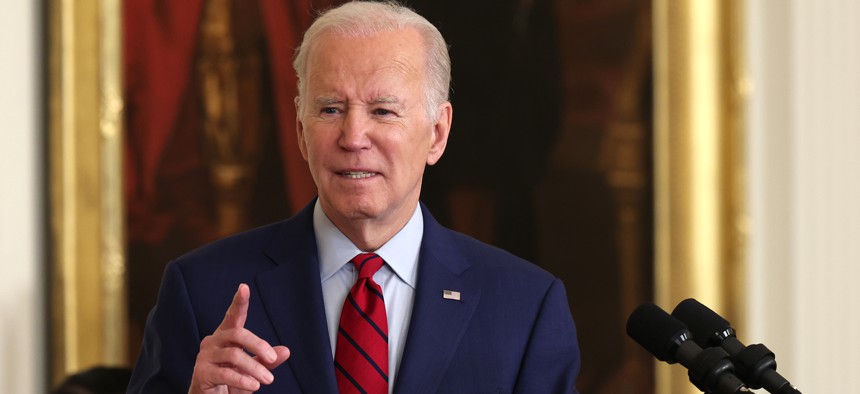
Like last year’s budget proposal, the president seeks to ensure there is an “equitable, effective and accountable government that delivers results for all.” Win McNamee/Getty Images
Accountability and Cost Efficiency Goals Amplified in Biden’s $6.9 Trillion Budget Proposal
This is just a wish list, as the administration still has to hammer out an agreement with a divided Congress.
President Biden unveiled his $6.9 trillion budget proposal for fiscal 2024 on Thursday that looks to ensure that the government is “equitable, effective and accountable,” as well as cut wasteful spending and further crack down on fraud.
Biden is proposing a total of $1.7 trillion in base discretionary funding, with an increase of 7.3% or $46.9 billion in non-defense discretionary spending from fiscal 2023 and a boost of 3.3%, or $28.1 billion in defense funding. However, if you count Veterans Affairs medical expenses in non-defense discretionary funding, which the White House started separating out last year, then the increase is 6.5%.
“It is time to finish the job, building on the ambitious progress we have made with new investments in America’s future,” President Biden wrote in his budget message to Congress. “My 2024 budget is a blue-collar blueprint to rebuild America in a fiscally responsible way that leaves no one behind.”
Like last year’s budget proposal, the president seeks to ensure there is an “equitable, effective and accountable government that delivers results for all,” and the proposal supports the implementation of the President’s Management Agenda, the budget documents read. Those goals include empowering the federal workforce, enhancing government customer service and harnessing federal buying power to advance the president’s goals.
Specifically, the budget seeks to further the administration’s goals of boosting “Made in America” policies, making the federal government a “model employer” and using the federal government’s purchasing power to “promote clean energy solutions and support American jobs while advancing equity.”
Some of the other priorities in the proposal include:
- Providing $17.8 billion for Justice Department law enforcement agencies, including nearly $2 billion for the Bureau of Alcohol, Tobacco, Firearms, and Explosives to expand its multijurisdictional gun trafficking strike force;
- Enhancing the biodefense and pandemic preparedness capabilities;
- Expanding implementation of the Veteran Small Business Certification program;
- Guaranteeing that the Indian Health Services gets “adequate and stable” funding; and
- Providing $366 million for the Interior Department “to better understand the impacts of climate change, identify innovative mitigation and adaptation opportunities, and measure and monitor greenhouse gas emissions and sinks on federal lands;”
- Expanding on the State Department and U.S. Agency for International Development’s investments in diversity, equity, inclusion and accessibility.
The budget proposal also seeks to cut wasteful spending on Big Pharma and “special interests” and through the tax code as well as crack down on fraud, such as in pandemic relief programs, and identity theft; and make programs more cost effective.
“The budget will empower law enforcement, investigators, and watchdogs to pursue, investigate, punish, and recover money from those who were engaged in the most major or sophisticated frauds,” said a factsheet. “This includes extending the statute of limitations for serious instances of fraud, increasing funding to triple the number of COVID-19 fraud strike forces, providing historic funding to inspectors general in agencies hit the hardest by pandemic fraud who are savings billions already with funds provided by the administration, and expanding analytic tools to audit and investigate possible fraud.”
This builds on a massive proposal the president released last week to combat COVID fraud and help victims of identity theft. The mandatory funding for this proposal was included in the budget request, but Congress can decide what vehicle to carry this proposal, said a White House spokesperson.
One of the ways the administration aims to make programs more cost effective is through canceling nearly $1 billion in “unused” construction funding for the Federal Bureau of Prisons due to the declining federal prison population.
With the Republicans controlling the House, a clash is likely to ensue and possibly raise the threat of a government shutdown. Also, under a new estimate from Moody's Analytics, the federal government faces an Aug. 18 deadline to avoid a “cataclysmic” debt ceiling breach.
“While they have consistently said that reducing the deficit is a top priority, Congressional Republicans have already proposed policies that would add an additional $3 trillion to the debt over the next decade—all while raising costs for working families and handing out tax giveaways to the wealthy and big corporations,” said a factsheet from the White House. “Until they produce a plan, we’re left to rely on a wide array of Republican budgets, statements, and proposals—past and present—which provide clear and consistent evidence that many critical programs the American people count on will be on the chopping block.”
Rep. Jodey Arrington, R-Texas, chairman of the House Budget Committee, told CNN on Wednesday that Republicans are in “no rush” and expect to release their budget proposal the second week of May.
On top of all this, anticipation is building for the president to announce his reelection campaign.
FCW’s Natalie Alms contributed to this report.







